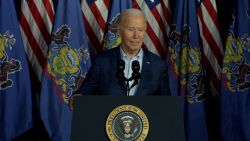Nine Democratic House moderates are threatening to withhold their support for their party’s must-pass budget resolution until Speaker Nancy Pelosi changes course and instead allows their chamber to first vote on the $1.2 trillion bipartisan infrastructure plan the Senate approved this week.
The threat, outlined in a letter provided to CNN, could put Pelosi’s plans in jeopardy to advance the budget resolution later this month since she can only afford to lose three votes from her caucus in the chamber that they narrowly control.
“We will not consider voting for a budget resolution until the bipartisan Infrastructure Investment and Jobs Act passes the House and is signed into law,” the letter to Pelosi said.
Approving the budget resolution is essential to enacting President Joe Biden’s agenda. The resolution, which the Senate also approved this week, must be adopted by the House before both chambers are allowed to advance a sweeping economic package worth $3.5 trillion through a process that can be approved along straight party lines since it cannot be filibustered in the Senate.
But Pelosi for weeks has made clear that the consensus within her caucus was to hold up the infrastructure bill until the Senate approves the larger Democratic-only bill, a move aimed at both pressuring moderate Senate Democrats to back the massive package but also ease concerns among House progressives that the $1.2 trillion infrastructure didn’t go far enough.
Now the new letter – led by Rep. Josh Gottheimer of New Jersey, the Democratic co-chairman of the bipartisan Problem Solvers Caucus – could throw Pelosi’s strategy into flux and underscores the complex balancing act that the White House and Democratic leaders must perform to keep their fragile coalition together.
“Some have suggested that we hold off on considering the Senate infrastructure bill for months – until the reconciliation process is completed. We disagree,” the group says, referring to the process used to advance the $3.5 trillion package. “With the livelihoods of hardworking American families at stake, we simply can’t afford months of unnecessary delays and risk squandering this once-in-a-century, bipartisan infrastructure package.”
A senior Democratic aide told CNN “there are not sufficient votes to pass the bipartisan infrastructure bill this month. This is 9. There are dozens upon dozens who will vote against the BIF unless it’s after the Senate passes reconciliation.”
More on Infrastructure
The letter is signed by Reps. Gottheimer, Vicente Gonzalez of Texas, Filemon Vela of Texas, Jared Golden of Maine, Ed Case of Hawaii, Kurt Schrader of Oregon, Henry Cuellar of Texas, Jim Costa of California and Carolyn Bourdeaux of Georgia.
The House is scheduled to return the week of August 23 to vote on the budget resolution, with Pelosi and Senate Majority Leader Chuck Schumer instructing their committee chairs to draft the larger bill – known in the Capitol as reconciliation legislation – by September 15. Their goal is to have both bills enacted by late September or early October. But if the House can’t pass the budget resolution, those plans could collapse.
On Friday, Democratic leadership continued frantically working with progressives and moderates to hammer out if there is a way forward, sources told CNN, but moderates aren’t all on the same page. Some are frustrated with Gottheimer and the other eight Democrats who signed onto the letter. It’s a disagreement over tactics rather than substance, but one that underscores the complicated and varying interests of a diverse caucus.
For days, another group of moderates had been working quietly with the White House and leadership to try air their grievances and work them out privately. While nine Democrats signed this letter, far more have been making clear to the House Democratic Whip’s office and leadership that they have concerns about the budget resolution. According to aides familiar with those talks, members have expressed concerns about both letting the bipartisan infrastructure bill languish and having to vote on a budget resolution with a $3.5 trillion price tag.
For many, the sequencing is just the beginning of the issue. As one aide put it, members on the frontlines are very aware that the GOP’s campaign arm the National Republican Congressional Committee is just “licking their chops” waiting for moderates to walk the plank and vote for a budget resolution with a $3.5 trillion topline. The fear for many moderates is taking that vote and then returning home while the bipartisan bill stalls.
There is also a practical concern. Highway funding expires at the end of September when a separate fight over government funding and the debt ceiling looms. The bipartisan infrastructure bill included that highway funding reauthorization and moderates argue time is of the essence to pass it.
The new letter Friday also comes two days after Pelosi reiterated to her caucus on a private call that there will be no vote in the House on the bipartisan infrastructure package until the Senate passes its reconciliation bill. That position is in line with the House’s progressive Democrats who have threatened to withhold their support for the infrastructure bill unless the reconciliation proposal is approved by the Senate.
The speaker said on the call she is “not freelancing” on her position on holding back passing the bipartisan bill until reconciliation is done.
“This is the consensus,” she said, according to a source familiar with the call. “The President has said he’s all for the bipartisan approach … bravo! That’s progress, but it ain’t the whole vision.”
But the plea has yet to move the group of moderate Democrats.
“President Biden swiftly applauded its passage, stating that he hopes Congress will send it to his desk as soon as possible,” the letter said, referring to the 50 Democrats and 19 Republicans who voted to pass the infrastructure bill in the Senate earlier this week. “The House of Representatives should heed his call and immediately pass the legislation.”
This story has been updated to include additional developments Friday.
CNN’s Lauren Fox contributed to this report.




















